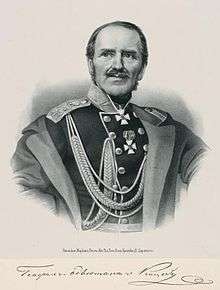Paul Demetrius Kotzebue

Count Paul Demetrius von Kotzebue (Russian: Коцебу, Павел Евстафьевич, Pavel Yevstafyevich Kotsebu) (August 10, 1801 in Berlin — April 19, 1884 in Reval) was a Baltic-German Russian officer, one of 18 children of German dramatist August von Kotzebue, and Governor-general of Warsaw (1874–1880) under Czar Alexander II (the Liberator), who had freed the serfs in 1861 and sold Alaska to the United States in 1867. The oceanic identation just north of Alaska's Seward Peninsula is named Kotzebue Sound, in honor of the Count's brother, explorer Otto von Kotzebue. The Kotzebue family had originated in Kassebau (Saxony-Anhalt).[1]
That a German like Kotzebue should hold the highest position in Russian Poland was not strange: Germans in Russia were noted for traditional German orderliness, discipline, frugality, and calculation. Germans in high government positions were noted for their efficiency and incorruptibility -- both characteristics in sharp contrast with Russian officials.[2]
By March 1879[3] Kotzebue was assisted by a Jewish secretary-general, Louis Feigenblatt, who was especially responsible for matters concerning the enormous[4] Jewish population of Russian Poland. As late as 1764, nearly 2 out of 3 of the world's Jews had lived in the pre-partition Polish–Lithuanian Commonwealth.[5] When the Czar was assassinated in 1881, his successor made the Jews scapegoats, which proved a turning point in their history.[6]
References
- ↑ Kotzebue Noble Family
- ↑ Migrations and cultures: a world view by Thomas Sowell (Basic Books, 1996).
- ↑ Archives israélites, Volume 40, No 10 (6 March 1879). Retrieved 8 June 2014.
- ↑ Pale of Settlement#Final demographics
- ↑ History of the Jews in Poland#The Cossack uprising and the Deluge
- ↑ History of the Jews in Poland#Pogroms within the Russian Empire